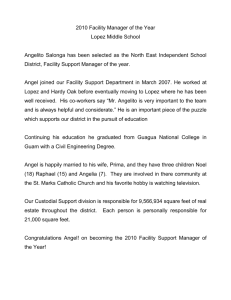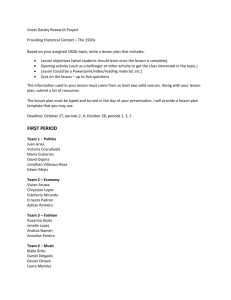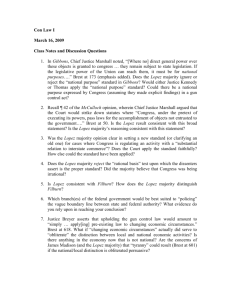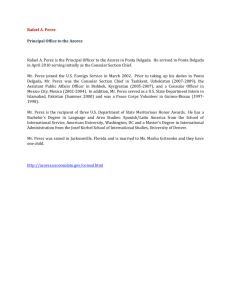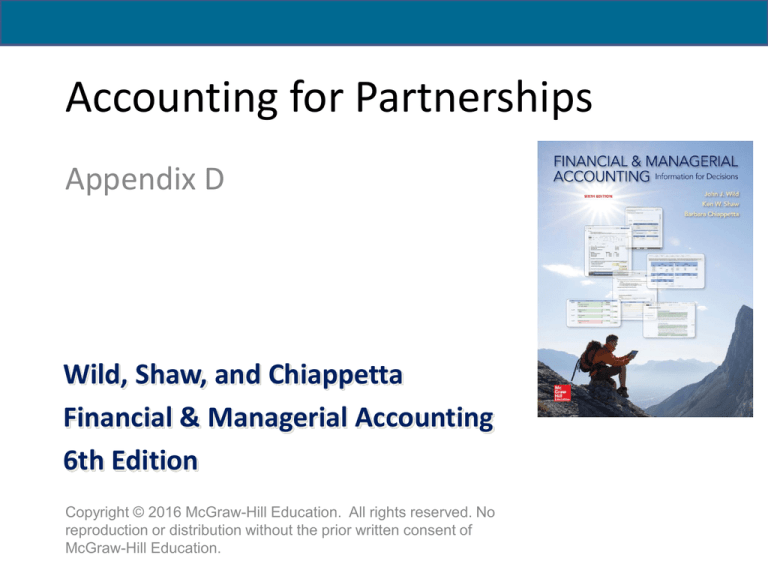
Accounting for Partnerships
Appendix D
Wild, Shaw, and Chiappetta
Financial & Managerial Accounting
6th Edition
Copyright © 2016 McGraw-Hill Education. All rights reserved. No
reproduction or distribution without the prior written consent of
McGraw-Hill Education.
D-C1: Partnership Form of
Organization
2
12 - 3
Partnership Form of Organization
Voluntary
Association
Partnership
Agreement
Limited
Life
Unlimited
Liability
Taxation
Mutual Agency
C1
Co-Ownership
of Property
3
12 - 4
Organizations with Partnership
Characteristics
Limited
Partnerships
(LP)
• General partners
assume management
duties and unlimited
liability for partnership
debts.
• Limited partners have
no personal liability
beyond invested
amounts.
C1
Limited
Liability
Partnerships
(LLP)
• Protects innocent
partners from
malpractice or
negligence claims.
• Most states hold all
partners personally
liable for partnership
debts.
Limited
Liability
Companies
(LLC)
• Members have same
limited liability feature
as owners of a
corporation.
• A limited liability
corporation typically has
a limited life.
4
12 - 5
Choosing a Business Form
Many factors should be
considered when choosing
the proper business form.
C1
5
D-P1: Organizing a
Partnership
6
12 - 7
Organizing a Partnership
Partners can invest both assets and liabilities in the
partnership.
Assets and liabilities are recorded at an agreed-upon
value, normally fair market value.
Asset contributions increase the partner’s capital
account.
Withdrawals from the partnership decrease the
partner’s capital account.
P1
7
12 - 8
Organizing a Partnership
On 1/11, Kayla Zayn and Hector Perez organize a partnership
called BOARDS. Zayn’s initial investment is $7,000 cash,
$33,000 in boarding facilities, and a note payable for
$10,000 on the boarding facilities. Perez’s initial investment
is $10,000 cash.
P1
8
12 - 9
Organizing a Partnership
In accounting for partnerships:
1. Partners’ withdrawals are debited to their own separate
withdrawals account.
2. Partners’ capital accounts are credited (or debited) for
their shares of net income (or net loss) when closing the
accounts at the end of the period.
3. Each partner’s withdrawal account is closed to that
partner’s capital account. Separate capital and
withdrawals accounts are kept for each partner.
P1
9
NEED-TO-KNOW
LeBron and Durant organize a partnership on January 1. LeBron’s initial net investment is $1,500,
consisting of cash ($350), equipment ($1,650), and a note payable reflecting a bank loan for the new
business ($500). Durant’s initial investment is cash of $800. These amounts are the values agreed on by
both partners. Prepare journal entries to record (1) LeBron’s investment and (2) Durant’s investment.
Date
Jan. 1
General Journal
Cash
Equipment
Note payable
LeBron, Capital
Debit
350
1,650
Credit
500
1,500
To record investment of LeBron
Jan. 1
Cash
Durant, Capital
800
800
To record investment of Durant
P1
10
D-P2: Dividing Income or
Loss
11
12 - 12
Dividing Income or Loss
Partners are not employees of the partnership but are
its owners. This means there are no salaries reported
as expense on the income statement. Profits or losses
of the partnership are divided on some agreed upon
ratio.
Three frequently used methods to
divide income or loss are allocation on:
1. Stated ratios.
2. Capital balances.
3. Services, capital, and stated ratios.
P2
12
12 - 13
Allocation on Stated Ratios
In the partnership agreement, Zayn is to receive 2/3
and Perez 1/3 of partnership income or loss. If the
partnership income is $60,000, we will allocate the
income to partners as follows:
$60,000 × 2/3 = $40,000
P2
13
12 - 14
Allocation on Capital Balances
In their partnership agreement, Zayn and Perez agree to
allocate profits and losses on the basis of their
beginning capital balances.
Balance
K. Zayn, Capital $ 30,000
H. Perez, Capital
10,000
Totals
$ 40,000
Ratio
75%
25%
100%
Dec 31 Income Summary
K. Zayn, Capital
H. Perez, Capital
P2
Income
$ 60,000
60,000
Allocation
$ 45,000
15,000
$ 60,000
60,000
To allocate income to partner's capital.
45,000
15,000
14
12 - 15
Allocation on Services, Capital,
and Stated Ratios
Zayn and Perez have a partnership agreement
with the following conditions:
1. Zayn receives a $36,000 annual salary allowance
and Perez receives an allowance of $24,000.
2. Each partner is allowed an annual interest
allowance of 10% on their beginning capital
balance.
3. Any remaining balance of income or loss is
allocated equally.
Net income is $70,000.
P2
15
12 - 16
Allocation on Services, Capital,
and Stated Ratios
Net income
Salaries
Interest
Equal allocation
Income to each partner
Income Allocation
Zayn
Perez
Remainder
$
70,000
$
36,000
$
24,000
10,000
3,000
1,000
6,000
3,000
3,000
42,000
28,000
$30,000 × 10% = $3,000
$10,000 × 10% = $1,000
$6,000 × ½ = $3,000
P2
16
12 - 17
Allocation on Services, Capital, and Stated
Ratios
Now let’s assume that net income is only $50,000.
Net income
Salaries
Interest
Equal allocation
Income to each partner
Income Allocation
Zayn
Perez
Remainder
$
50,000
$
36,000
$
24,000
(10,000)
3,000
1,000
(14,000)
(7,000)
3,000
(7,000)
3,000
(20,000)
42,000
32,000
28,000
18,000
($14,000) × ½ = ($7,000)
P2
17
NEED-TO-KNOW
Merkel and Putin began a partnership by investing $6,000 and $4,000, respectively. During its first year, the
partnership earned $80,000. Prepare calculations showing how the $80,000 income is allocated to the partners
under each of the following three separate plans for sharing income and loss:
(1) The partners failed to agree on a method to share income.
(2) The partners agreed to share income and loss in proportion to their initial investments.
(3) The partners agreed to share income by granting a $35,000 per year salary allowance to Merkel,
a $13,000 per year salary allowance to Putin, 20% interest on their initial capital investments, and any
remaining balance shared 70% to Merkel and 30% to Putin.
Income Summary
Dec. 31
Merkel, Capital
Invest.
P2
6,000
80,000
Putin, Capital
Invest.
4,000
18
NEED-TO-KNOW
(1) The partners failed to agree on a method to share income.
Plan 1
$80,000 x 1/2
Date
Dec. 31
Merkel
$40,000
General Journal
Income summary
Merkel, Capital
Putin, Capital
Putin
$40,000
Total
$80,000
Debit
80,000
Credit
40,000
40,000
To allocate income under plan 1
Close
Income Summary
Dec. 31
80,000
80,000
-0-
Merkel, Capital
Invest.
Close
Dec. 31
P2
6,000
40,000
46,000
Putin, Capital
Invest.
Close
Dec. 31
4,000
40,000
44,000
19
NEED-TO-KNOW
(2) The partners agreed to share income and loss in proportion to their initial investments.
Plan 2
$80,000 x ($6,000 / $10,000)
$80,000 x ($4,000 / $10,000)
Merkel
$48,000
$48,000
Date
Dec. 31
General Journal
Income summary
Merkel, Capital
Putin, Capital
Putin
$32,000
$32,000
Debit
80,000
Total
$48,000
32,000
$80,000
Credit
48,000
32,000
To allocate income under plan 2
Close
Income Summary
Dec. 31
80,000
80,000
-0-
Merkel, Capital
Invest.
Close
Dec. 31
P2
6,000
48,000
54,000
Putin, Capital
Invest.
Close
Dec. 31
4,000
32,000
36,000
20
NEED-TO-KNOW
(3) The partners agreed to share income by granting a $35,000 per year salary allowance to Merkel,
a $13,000 per year salary allowance to Putin, 20% interest on their initial capital investments, and any
remaining balance shared 70% to Merkel and 30% to Putin.
Plan 3
Net income
Salary Allowances:
Interest Allowances:
$6,000 x 20%
$4,000 x 20%
Total Salary and Interest Allowances
Balance of income
Balance allocated (Merkel, 70%; Putin, 30%)
Balance of income
Shares of each partner
Date
Dec. 31
General Journal
Income summary
Merkel, Capital
Putin, Capital
Merkel
Putin
$35,000
$13,000
1,200
800
21,000
9,000
$57,200
$22,800
Debit
80,000
Total
$80,000
48,000
1,200
800
50,000
30,000
30,000
$0
Credit
57,200
22,800
To allocate income under plan 3
P2
21
12 - 22
Partnership Financial Statements
During 2015, Zayn withdrew $20,000 cash from the
partnership and Perez withdrew $12,000. Net income for the
year is $70,000.
BOARDS
Statement of Partners' Equity
For the Year Ended December 31, 2015
Zayn
Perez
Total
Beginning capital balances
$
$
$
Investments by owners
30,000
10,000
40,000
Net income
Salary allowances
$ 36,000
$ 24,000
Interest allowances
3,000
1,000
Balance allocated
3,000
3,000
Total net income
42,000
28,000
70,000
Less partners' withdrawals
(20,000)
(12,000)
(32,000)
Ending capital balances
$ 52,000
$ 26,000 $
78,000
P2
22
D-P3: Admission and
Withdrawal of Partners
23
12 - 24
Admission and Withdrawal of Partners
When the makeup of the partnership changes, the
existing partnership is dissolved.
A new partnership may be immediately formed.
New partner acquires partnership interest by:
1. Purchasing it from the other partners, or
2. Investing assets in the partnership.
P3
24
12 - 25
Purchase of Partnership Interest
• A new partner can purchase
partnership interest directly
from the existing partners.
The cash goes to the partners,
not to the partnership.
• To become a partner, the new
partner must be accepted by the
current partners.
P3
25
12 - 26
Purchase of Partnership Interest
On January 4th, Hector Perez sells one-half of his partnership
interest to Tyrell Rasheed for $18,000. Perez gives up a $13,000
recorded interest in the partnership.
Capital balances before new partner
Allocation to new partner
Capital balances after new partner
P3
Zayn
Perez
Rasheed
Total
$ 52,000 $ 26,000 $
$ 78,000
(13,000)
13,000
$ 52,000 $ 13,000 $ 13,000 $ 78,000
26
12 - 27
Investing Assets in a Partnership
• The new partner can gain
partnership interest by
contributing assets to the
partnership.
• The new assets will increase
the partnership’s net assets.
• After admission, both assets
and equity will increase.
P3
27
12 - 28
Investing Assets in a Partnership
On January 4th, Tyrell Rasheed is admitted to the
partnership with a payment of $22,000 cash.
Capital balances before new partner
Allocation to new partner
Capital balances after new partner
P3
Zayn
Perez
Rasheed
Total
$ 52,000 $ 26,000 $
$ 78,000
22,000
22,000
$ 52,000 $ 26,000 $ 22,000 $ 100,000
28
12 - 29
Bonus to Old or New Partners
Bonus to Old
Partners
When the current value of a partnership
is greater than the recorded amounts of
equity, the old partners usually require a
new partner to pay a bonus when
joining.
Bonus to New
Partners
The partnership may grant a bonus to a
new partner if the business is in need of
cash or if the new partner has
exceptional talents.
P3
29
12 - 30
Bonus to Old Partners
On January 4th, Zayn and Perez agree to accept Rasheed as a
partner upon his investment of $42,000 cash in the partnership.
Rasheed is to receive a 25% ownership interest in the new
partnership. Any bonus is attributable to the existing partners
and is shared equally.
Equity of Zayn and Perez
Investment by Rasheed
Total partnership equity
Rasheed's ownership percent
Rasheed's equity balance
P3
$ 78,000
42,000
120,000
25%
$ 30,000
30
12 - 31
Bonus to Old Partners
On January 4th, Zayn and Perez agree to accept Rasheed as a
partner upon his investment of $42,000 cash in the
partnership. Rasheed is to receive a 25% ownership interest
in the new partnership. Any bonus is attributable to the
existing partners and is shared equally.
$42,000 - $30,000 = $12,000 × ½ = $6,000
P3
31
12 - 32
Bonus to New Partner
On January 4th, Zayn and Perez agree to accept Rasheed as a
partner upon his investment of $18,000 cash in the
partnership. Rasheed is to receive a 25% ownership interest
in the new partnership. Any bonus is attributable to
Rasheed’s excellent business skills.
Equity of Zayn and Perez
Investment by Rasheed
Total partnership equity
Rasheed's ownership percent
Rasheed's equity balance
P3
$ 78,000
18,000
96,000
25%
$ 24,000
32
12 - 33
Bonus to New Partner
On January 4th, Zayn and Perez agree to accept Rasheed as a
partner upon his investment of $18,000 cash in the
partnership. Rasheed is to receive a 25% ownership interest
in the new partnership. Any bonus is attributable to
Rasheed’s excellent business skills.
$18,000 - $24,000 = $(6,000) × ½ = $(3,000)
P3
33
NEED-TO-KNOW
Anne, Portia, and Hedison are partners and share income and loss in a 2:3:5 ratio. The partnership’s capital
balances are as follows: Anne, $300; Portia, $150; and Hedison, $450. Ellen is admitted to the partnership on
May 1 with a 25% equity. Prepare journal entries to record Ellen’s entry into the partnership under each of the
following separate assumptions: Ellen invests (a) $300; (b) $100; and (c) $700.
a) Ellen invests $300.
Partnership Capital
Anne, Capital
Portia, Capital
Hedison, Capital
Ellen, Capital
Total
Date
May 1
Before
$300
150
450
($900 + $300) x 25%
$900
General Journal
Cash
Ellen, Capital
Change
$0
0
0
300
$300
After
$300
150
450
300
$1,200
Debit
Credit
300
($900 + $300) x 25%
300
To record admission of Ellen, with no bonus
P3
34
NEED-TO-KNOW
Anne, Portia, and Hedison are partners and share income and loss in a 2:3:5 ratio. The partnership’s capital
balances are as follows: Anne, $300; Portia, $150; and Hedison, $450. Ellen is admitted to the partnership on
May 1 with a 25% equity. Prepare journal entries to record Ellen’s entry into the partnership under each of the
following separate assumptions: Ellen invests (a) $300; (b) $100; and (c) $700.
b) Ellen invests $100.
Partnership Capital
Anne, Capital
Portia, Capital
Hedison, Capital
Ellen, Capital
Total
Date
May 1
($250 - $100) x 2/10
($250 - $100) x 3/10
($250 - $100) x 5/10
($900 + $100) x 25%
Before
$300
150
450
$900
General Journal
Cash
Anne, Capital
Portia, Capital
Hedison, Capital
Ellen, Capital
($250 - $100) x 2/10
($250 - $100) x 3/10
($250 - $100) x 5/10
($900 + $100) x 25%
Change
($30)
(45)
(75)
250
$100
After
$270
105
375
250
$1,000
Debit
Credit
100
30
45
75
250
To record admission of Ellen, with bonus
P3
35
NEED-TO-KNOW
Anne, Portia, and Hedison are partners and share income and loss in a 2:3:5 ratio. The partnership’s capital
balances are as follows: Anne, $300; Portia, $150; and Hedison, $450. Ellen is admitted to the partnership on
May 1 with a 25% equity. Prepare journal entries to record Ellen’s entry into the partnership under each of the
following separate assumptions: Ellen invests (a) $300; (b) $100; and (c) $700.
c) Ellen invests $700.
Partnership Capital
Anne, Capital
Portia, Capital
Hedison, Capital
Ellen, Capital
Total
Date
May 1
($700 - $400) x 2/10
($700 - $400) x 3/10
($700 - $400) x 5/10
($900 + $700) x 25%
Before
$300
150
450
$900
General Journal
Cash
Anne, Capital
Portia, Capital
Hedison, Capital
Ellen, Capital
Change
$60
90
150
400
$700
After
$360
240
600
400
$1,600
Debit
Credit
700
($700 - $400) x 2/10
($700 - $400) x 3/10
($700 - $400) x 5/10
($900 + $700) x 25%
60
90
150
400
To record admission of Ellen, with bonus
P3
36
12 - 37
Withdrawal of a Partner
A partner can withdraw
in two ways:
1. The partner can sell his/
her partnership interest
to another person.
2. The partnership can
distribute cash and/or
other assets to the
withdrawing partner.
P3
37
12 - 38
Withdrawal of a Partner
At the date of the withdrawal of Perez, the partners have the
following capital balances: Perez - $38,000, Zayn - $84,000, and
Rasheed - $38,000. The partners share income and loss equally.
Perez is to receive $38,000 cash upon withdrawal from the
partnership.
No Bonus
P3
38
12 - 39
Withdrawal of a Partner
At the date of the withdrawal of Perez, the partners have the following
capital balances: Perez - $38,000, Zayn - $84,000, and Rasheed - $38,000.
The partners share income and loss equally. Perez is to receive $34,000 cash
upon withdrawal from the partnership.
Bonus to Remaining Partners
P3
Capital balance
Cash settlement
Bonus
Times
Bonus to each partner
$ 38,000
34,000
4,000
50%
$ 2,000
39
12 - 40
Withdrawal of a Partner
At the date of the withdrawal of Perez, the partners have the following
capital balances: Perez - $38,000, Zayn - $84,000, and Rasheed $38,000. The partners share income and loss equally. Perez is to
receive $40,000 cash upon withdrawal from the partnership.
Bonus to Withdrawing Partner
Capital balance
Cash settlement
Deficiency
Times
To each partner
P3
$ 38,000
40,000
2,000
50%
$ 1,000
40
12 - 41
Death of a Partner
A partner’s death dissolves a partnership. A deceased
partner’s estate is entitled to receive his or her equity. The
partnership agreement should contain provisions for
settlement. These provisions usually require:
1. Closing the books to determine income or loss since the
end of the previous period, and
2. Determining and recording current market values for
both assets and liabilities.
Settlement of the deceased partner’s estate can involve
selling the equity to remaining partners or to an outsider,
or it can involve withdrawal of assets.
P3
41
NEED-TO-KNOW
Fluffy, Anjelah, and Lopez are partners and share income and loss in a 2:3:5 ratio. The partnership’s capital
balances are as follows: Fluffy, $330; Anjelah, $270; and Lopez, $400. Lopez decides to withdraw from the
partnership, and the partners agree to not revalue the assets upon Lopez’s retirement. Prepare journal entries
to record Lopez’s May 1 withdrawal from the partnership under each of the following separate assumptions:
(a) Lopez sells his interest to Mencia for $500 after Fluffy and Anjelah approve the entry of Mencia as a
partner.
Before
$330
270
400
Fluffy, Capital
Anjelah, Capital
Lopez, Capital
Mencia, Capital
Total
Date
May 1
$1,000
General Journal
Lopez, Capital
Mencia, Capital
Change
($400)
400
$0
Debit
After
$330
270
0
400
$1,000
Credit
400
400
To record admission of Mencia
P3
42
NEED-TO-KNOW
Fluffy, Anjelah, and Lopez are partners and share income and loss in a 2:3:5 ratio. The partnership’s capital
balances are as follows: Fluffy, $330; Anjelah, $270; and Lopez, $400. Lopez decides to withdraw from the
partnership, and the partners agree to not revalue the assets upon Lopez’s retirement. Prepare journal entries
to record Lopez’s May 1 withdrawal from the partnership under each of the following separate assumptions:
(b) Lopez gives his interest to a son-in-law, Madrigal, and thereafter Fluffy and Anjelah accept
Madrigal as a partner.
Before
$330
270
400
Fluffy, Capital
Anjelah, Capital
Lopez, Capital
Madrigal, Capital
Total
Date
May 1
$1,000
General Journal
Lopez, Capital
Madrigal, Capital
Change
($400)
400
$0
After
$330
270
0
400
$1,000
Debit
Credit
400
400
To record admission of Madrigal
P3
43
NEED-TO-KNOW
Fluffy, Anjelah, and Lopez are partners and share income and loss in a 2:3:5 ratio. The partnership’s capital
balances are as follows: Fluffy, $330; Anjelah, $270; and Lopez, $400. Lopez decides to withdraw from the
partnership, and the partners agree to not revalue the assets upon Lopez’s retirement. Prepare journal entries
to record Lopez’s May 1 withdrawal from the partnership under each of the following separate assumptions:
(c) Lopez is paid $400 in partnership cash for his equity.
Before
$330
270
400
$1,000
Fluffy, Capital
Anjelah, Capital
Lopez, Capital
Total
Date
May 1
General Journal
Lopez, Capital
Cash
Change
($400)
($400)
Debit
After
$330
270
0
$600
Credit
400
400
To record withdrawal of Lopez, with no bonus
P3
44
NEED-TO-KNOW
Fluffy, Anjelah, and Lopez are partners and share income and loss in a 2:3:5 ratio. The partnership’s capital
balances are as follows: Fluffy, $330; Anjelah, $270; and Lopez, $400. Lopez decides to withdraw from the
partnership, and the partners agree to not revalue the assets upon Lopez’s retirement. Prepare journal entries
to record Lopez’s May 1 withdrawal from the partnership under each of the following separate assumptions:
(d) Lopez is paid $600 in partnership cash for his equity.
Ratio
Fluffy, Capital ($600 - $400) x 2/5
2
Anjelah, Capital ($600 - $400) x 3/5
3
Lopez, Capital
5
Total
Before
$330
270
400
$1,000
Change
($80)
(120)
(400)
($600)
After
$250
150
0
$400
After Lopez's withdrawal, Fluffy and Anjelah share income and loss in a 2:3 ratio.
Date
May 1
General Journal
Lopez, Capital
Fluffy, Capital
($600 - $400) x 2/5
Anjelah, Capital ($600 - $400) x 3/5
Cash
Debit
Credit
400
80
120
600
To record withdrawal of Lopez, with bonus
P3
45
NEED-TO-KNOW
Fluffy, Anjelah, and Lopez are partners and share income and loss in a 2:3:5 ratio. The partnership’s capital
balances are as follows: Fluffy, $330; Anjelah, $270; and Lopez, $400. Lopez decides to withdraw from the
partnership, and the partners agree to not revalue the assets upon Lopez’s retirement. Prepare journal entries
to record Lopez’s May 1 withdrawal from the partnership under each of the following separate assumptions:
(e) Lopez is paid $70 in partnership cash plus equipment recorded on the partnership books at $40
less its accumulated depreciation of $10. Partnership assets decrease by $100; ($70 + $40 - $10).
Fluffy, Capital ($400 - $100) x 2/5
Anjelah, Capital ($400 - $100) x 3/5
Lopez, Capital
Total
Ratio
2
3
5
Before
$330
270
400
$1,000
Change
$120
180
($400)
($100)
After
$450
450
0
$900
After Lopez's withdrawal, Fluffy and Anjelah share income and loss in a 2:3 ratio.
Date
May 1
General Journal
Lopez, Capital
Accumulated depreciation - Equipment
Fluffy, Capital
[$400 - ($70 +$40-$10)] x 2/5
Anjelah, Capital [$400 - ($70 +$40-$10)] x 3/5
Equipment
Cash
Debit
Credit
400
10
120
180
40
70
To record withdrawal of Lopez, with bonus
P3
46
D-P4:
Liquidation of a
Partnership
47
12 - 48
Liquidation of a Partnership
A partnership dissolution requires 3 steps following
the sale of noncash assets and the recording of a gain
or loss on liquidation.
1. Gain or loss on liquidation is allocated to partners using
their income-and-loss ratio.
2. Liabilities are paid or settled.
3. Any remaining cash is distributed to partners based on
their capital balances.
P4
48
12 - 49
No Capital Deficiency
No capital deficiency means that all partners have a zero or credit
balance in their capital accounts.
Zayn, Perez, and Rasheed agree to dissolve their partnership.
The only outstanding liability is an account payable of $20,000. Prior to
dissolution the partnership has the following balance sheet:
P4
49
12 - 50
No Capital Deficiency
BOARDS begins the dissolution process by selling the land for
$46,000 cash. The gain on the sale of the land is distributed equally
among the partners. After the sale of the land the company pays
the account payable.
P4
50
12 - 51
No Capital Deficiency
After step 2, we have the following capital balances along with the remaining cash balance.
P4
51
12 - 52
Capital Deficiency
Capital deficiency means that at least one partner has a
debit balance in his or her capital account at the point of
final cash distribution. This can arise from liquidation
losses, excessive withdrawals before liquidation, or
recurring losses in prior periods. A partner with a capital
deficiency must, if possible, cover the deficit by paying
cash into the partnership.
P4
52
12 - 53
Capital Deficiency
Zayn, Perez, and Rasheed agree to dissolve their partnership.
Prior to the final distribution of cash to the partners, Zayn has a capital
balance of $19,000, Perez $8,000, and Rasheed $(3,000). Rasheed owes
the partnership $3,000 and is able to pay the amount.
P4
53
12 - 54
Partner Cannot Pay Deficiency
Let’s use the information from our previous example of a capital
deficiency and assume partners divide profit and losses equally.
Ending capital balances
Allocation of $3,000 deficiency
Capital balances for dissolution
P4
Zayn
Perez Rasheed
Total
$ 19,000 $ 8,000 $ (3,000) $ 24,000
(1,500)
(1,500)
3,000
17,500
6,500
24,000
54
12 - 55
Global View
Partnership accounting according to U. S. GAAP is similar, but not
identical, to that under IFRS.
1. Both U. S. GAAP and IFRS include broad and similar guidance for
partnership accounting. Partnership organization is similar
worldwide, however, different legal systems dictate different
implications and motivations for how a partnership is effectively
set up.
2. The account for partnership admission, withdrawal, and
liquidation is likewise similar worldwide. However, different
legal systems impact partnership agreements and their
implication to the parties.
55
D-A1: Partner Return on
Equity
56
12 - 57
Partner Return on Equity
Partner return
=
on equity
A1
Partner net income
Average partner equity
216/[(85+253)/2] = 128%
57
12 - 58
End of Appendix D
58

